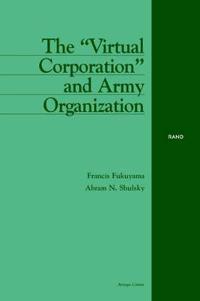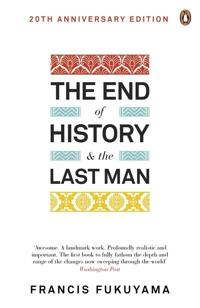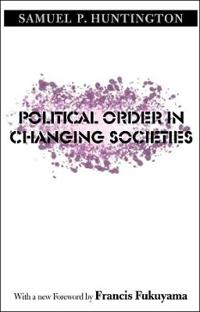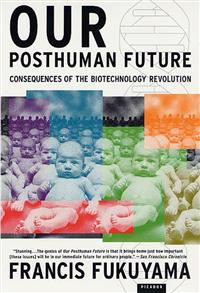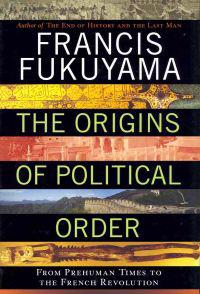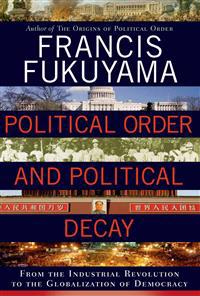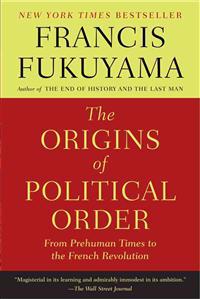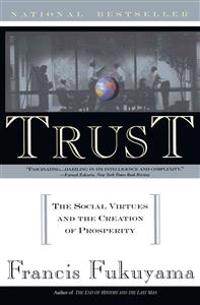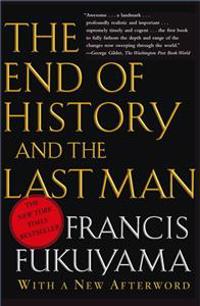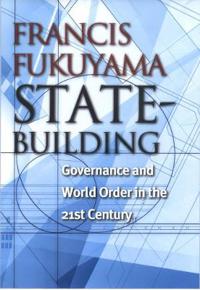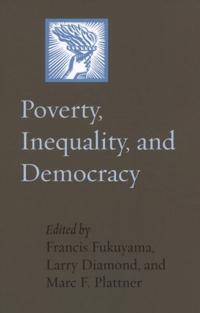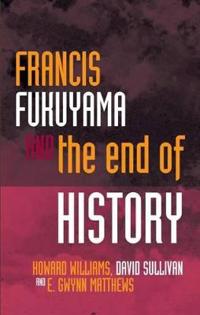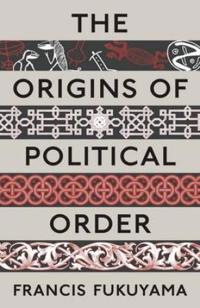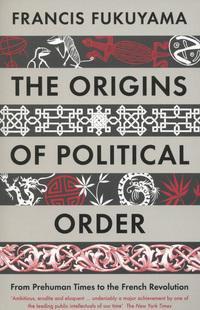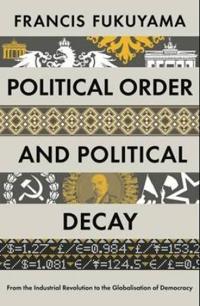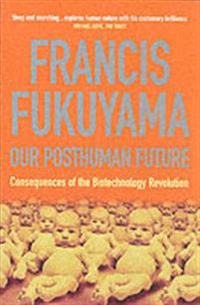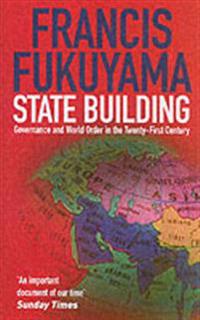The "Virtual Corporation" and Army Organization (Pocket)
avFrancis Fukuyama, Abram N. Shulsky, Francis Fukuyama
ISBN: 9780833025326 - UTGIVEN: 1997-08The authors examine how the organizational structure of commercial corporations has changed over the past 10-15 years, in order to understand what lessons from that experience might be applied to the U.S. Army.[...]
The End of History and the Last Man (Häftad)
avFrancis Fukuyama
ISBN: 9780241960240 - UTGIVEN: 20121020th anniversary edition of "The End of History and the Last Man", a landmark of political philosophy by Francis Fukuyama, author of "The Origins of Political Order". With the fall of Berlin Wall in 1989 the threat of the Cold War which had dominated the second half of the twentieth century vanished[...]
Political Order in Changing Societies (Pocket)
avSamuel P. Huntington, Francis Fukuyama, Samuel P. Huntington
ISBN: 9780300116205 - UTGIVEN: 200605This now-classic examination of the development of viable political institutions in emerging nations is a major and enduring contribution to modern political analysis. In a new Foreword, Francis Fukuyama assesses Huntington's achievement, examining the context of the book's original publication as w[...]
Our Posthuman Future: Consequences of the Biotechnology Revolution (Häftad)
avFrancis Fukuyama
ISBN: 9780312421717 - UTGIVEN: 200305The Origins of Political Order: From Prehuman Times to the French Revolution (Inbunden)
avFrancis Fukuyama
ISBN: 9780374227340 - UTGIVEN: 201104A "New York Times" Notable Book for 2011 A "Globe and Mail" Best Books of the Year 2011 TitleA "Kirkus Reviews" Best Nonfiction of 2011 title Virtually all human societies were once organized tribally, yet over time most developed new political institutions which included a central state that could [...]
Political Order and Political Decay: From the Industrial Revolution to the Globalization of Democracy (Inbunden)
avFrancis Fukuyama
ISBN: 9780374227357 - UTGIVEN: 2014-10The second volume of the bestselling landmark work on the history of the modern state
Writing in "The Wall Street Journal," David Gress called Francis Fukuyama's" Origins of Political Order" "magisterial in its learning and admirably immodest in its ambition." In "The New York Times Book Review,[...]The Origins of Political Order: From Prehuman Times to the French Revolution (Häftad)
avFrancis Fukuyama
ISBN: 9780374533229 - UTGIVEN: 201203A "New York Times" Notable Book for 2011 A "Globe and Mail" Best Books of the Year 2011 TitleA "Kirkus Reviews" Best Nonfiction of 2011 title Virtually all human societies were once organized tribally, yet over time most developed new political institutions which included a central state that could [...]
Trust (Pocket)
avFrancis Fukuyama
ISBN: 9780684825250 - UTGIVEN: 199606In his bestselling "The End of History and the Last Man", Francis Fukuyama argued that the end of the Cold War would also mean the beginning of a struggle for position in the rapidly emerging order of 21st-century capitalism. In "Trust", a penetrating assessment of the emerging global economic order[...]
The End of History and the Last Man (Häftad)
avFrancis Fukuyama
ISBN: 9780743284554 - UTGIVEN: 200602Enhanced by a new afterword dealing with the post-September 11th world, a provocative exploration of issues of human society and destiny answers such questions as, is there a direction to human history? does history have an end? and where are we now? Reprint. 25,00 first printing.[...]
State-Building (Inbunden)
avFrancis Fukuyama
ISBN: 9780801442926 - UTGIVEN: 200404A scholar and author of Our Posthuman Future focuses on the building of new nation-states, discussing the causes of contemporary state weakness and the international consequences of weak states and what can be done to benefit the citizens of these countries.[...]
Poverty, Inequality, and Democracy (Pocket)
avFrancis Fukuyama, Larry Diamond, Marc F. Plattner
ISBN: 9781421405704 - UTGIVEN: 201202The rise of populism in new democracies, especially in Latin America, has brought renewed urgency to the question of how liberal democracy deals with issues of poverty and inequality. Citizens who feel that democracy failed to improve their economic condition are often vulnerable to the appeal of po[...]
Political Order and Political Decay: From the Industrial Revolution to the Globalization of Democracy (Övrigt)
avFrancis Fukuyama
ISBN: 9781491584873 - UTGIVEN: 2014-11Writing in "The Wall Street Journal," David Gress called Francis Fukuyama s "Origins of Political Order" magisterial in its learning and admirably immodest in its ambition. In "The New York Times Book Review," Michael Lind described the book as a major achievement by one of the leading public intell[...]
Francis Fukuyama and the End of History
ISBN: 9781783168767 - UTGIVEN: 2016-10Fukuyama's concept of the End of History has been one of the most widely debated theories of international politics since the end of the Cold War. This book discusses Fukuyama's claim that liberal democracy alone is able to satisfy the human aspiration for freedom and dignity, and explores the way i[...]
The Origins of Political Order (Inbunden)
avFrancis Fukuyama
ISBN: 9781846682568 - UTGIVEN: 201105This is Francis Fukuyama's most important book since the pathbreaking "End of History". Nations are not trapped by their pasts, but events that happened hundreds or even thousands of years ago continue to exert huge influence on present-day politics. If we are to understand the politics that we now [...]
The Origins of Political Order (Storpocket)
avFrancis Fukuyama
ISBN: 9781846682575 - UTGIVEN: 201204This is Francis Fukuyama's most important book since the pathbreaking "End of History". Nations are not trapped by their pasts, but events that happened hundreds or even thousands of years ago continue to exert huge influence on present-day politics. If we are to understand the politics that we now [...]
Political Order and Political Decay (Inbunden)
avFrancis Fukuyama
ISBN: 9781846684364 - UTGIVEN: 2014-09Our Posthuman Future (Häftad)
avFrancis Fukuyama
ISBN: 9781861974952 - UTGIVEN: 200304Is a baby whose personality has been chosen from a gene supermarket still a human? If we choose what we create what happens to morality? Is this the end of human nature? This book addresses these questions.[...]
State Building (Häftad)
avFrancis Fukuyama
ISBN: 9781861977045 - UTGIVEN: 200507Weak or failed states - where no government is in control - are the source of many of the world's most serious problems, from poverty, AIDS and drugs to terrorism. This book explains the concept of state-building and discusses the problems and causes of state weakness and its national and internatio[...]

